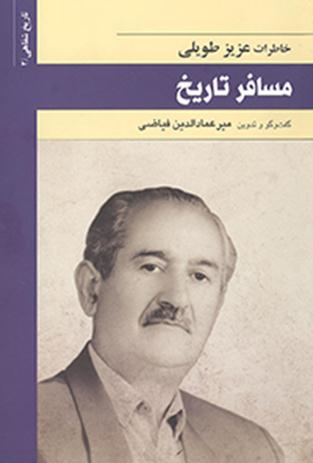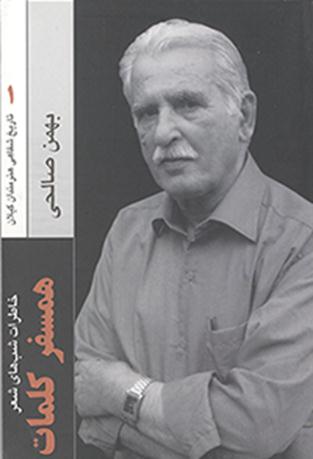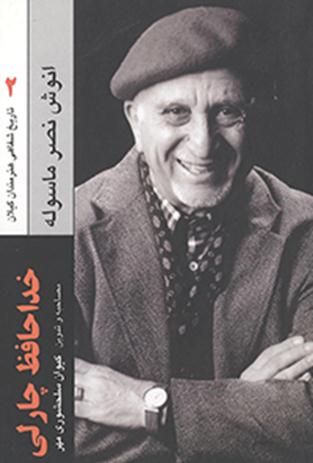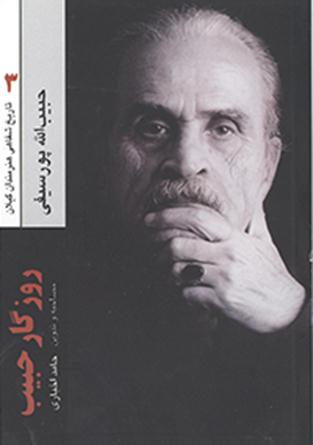History traveler, Words Companion, Goodbye Charlie, Habib Time etc…
Memories for Oral History of Gilan
Art Bureau of Gilan has released since 2015 so far volumes of two book series that "oral history" is their general introducer.
Mohammadali Fatemi
Translated by Ruholallah Golmoradi
2017-1-22
Individuals and Families, Job and Environment
One of the series published two volumes: "Gray Years: memories of Doctor Hushang Montaseri", interviewed and the formulated by Ali Amiri and "History Traveler: memories of Aziz Tavili" interviewed and the formulated by Miremad al-Din Fayyazi W. The two books were released by Ilia Culture Publication that is working in Rasht.
Oral History website's Readers before it have been met eight chapters and 344-page book of "Gray Years" (published in 2015); a work including memories one of officials of Palavi II about realities of some events that have been observed himself.

"History Traveler" (published in 2016) in 392 pages with 35 chapters and appendices of sample of poetry, index and photos, includes memories of Aziz Tavili, a researcher and writer from Gilan. The book begins with notes of Gilan Art Bureau and a note of the editor. It is stated in a paragraph of the note that "oral history is not just description of bittersweet and story of Joy and Sorrow but a hint at sociology, anthropology, ecology, economics, politics, religion ...." we find out also from hint of the editor that "it includes memoirs of the narrator till 1979. So most of the memories are about years before victory of the Islamic Revolution, which was part of the narrator's life in the Imperial Navy. In this respect, memories a personnel of the pillar 2 is regarded that then was transferred to counter-intelligence of Bandar-e Anzali Navy Base, As well as memories of days of Russian Soldats who entered Anzali in excuse of World War II."
According to the narrator it is stated too: "I wrote this biography since far last years, daily during occurrence of accidents or next day so that one day maybe be considered and exploited. But because of improper maintenance of papers and that they were torn due to moisture, I had to re-write it, but I tried not to add or subtract a word."
The structure of the text is formed as most of narrated events have exact date, and this indicates it is auto-biography. Some parts which are not in this way show that provided in an interview with the narrator. Whether that or this, content after offering information about the narrator's person and family, paid attention to his job and environment; a job that is military occupation and an environment that is northern Iran, and influence of social and political events on these. In this perspective, the narrator succeeded to manage his auto-biography in such a way that stimulates audience's curiosity in the same themes that were noted.
Rasht Days
Another series of Gilan Art Bureau that has been released some volumes by Ilia Culture Publication, generally titled "Oral History of Gilan Artists". Published titles include " Words Companion: Memories of Poetry Nights", memories of Bahman Salehi, "Goodbye Charlie: Memories of Anoosh Nasre Masouleh (Nasrallahzadeh)" interviewer and editor Keivan Salahshoori Mehr, "Habib Time: Memories of Habibollah Poorseifyi" interviewed and edited by Hamed Ekhbari.

"Words Companion" (published in 2015) at 201 pages, includes memoir of Bahman Salehi that he himself stated: "It is part of my memories, with mostly humorous view, of numerous poetry nights I has participated in a few years before the Revolution to the present, whether encouraged by friends, or because of sympathy with the revolution, or inner desire to travel and tour in cities of our lovely homeland, Iran, and or because of occupational engagement in the respective department for doing cultural affairs."
In memories of Salehi, days and persons who were prominent in his mind are notable and because the days and persons are well known too out of the atmosphere, so they are absorbing for the audience too. Poetry of 1980s (1360s SH) and 1990s (1370s SH) and poetry congresses of Sacred Defense are also topics that Salehi referred to some memories about them and the memories more late, has greater historical value.
The second book of series "Oral History of Gilan Artists ", "Goodbye Charlie" (published in 2015) includes

333 pages and 7 chapters. Memories of Anoosh Nasre Masouleh (Nasrallhzadeh) enters in environment of theater and cinema and radio in Gilan and Rasht, and includes story of the narrator since 1950s (1330s SH) to the days that he played in TV show "Kuchake Jangali (forestry young)". His observations and narrates is finally also a history of performing arts in Rasht, and impact of historical and political events on them is clear. As chapter VI of the book titled "Revolution Time" and the narrator talks about his mood and surrounding in 1979.

"Habibi Time" (published in 2016) with 203 pages also addresses life and story of Habibollah Poorseifi, a teacher, actor and director from Gilan and has 5 chapters. He remembers days when he and Khosrow Golsorkhi were servants of ceremony of Ahl al-Bayt (AS), had seen tanks that were brought to streets of Rasht due to June 5, 1963, demonstrations in Iran, and has played in TV Shows of "Kuchake Jangali" and the movie "Ey Iran". It also, similar to "Goodbye Charlie", includes names and addresses of Gilan's art history, especially in Rasht city, that in series of "Oral History of Gilan Artists" is complementary of the purpose that Art Bureau of the province follows in publication such books: "What is important in oral history is addressing details and following events step by step and more knowledge of the events that could be considered a help for a correct analysis of history."
Of course, about these two book series that that were listed some of their features and title "oral history" is their general introducer, it seems that the debate has started that to what extent they are oral history or memoir? Because 5 works has been produced and the number is so much that needed to be reviewed and criticized.
Number of Visits: 5651








The latest
Most visited
Attack on Halabcheh narrated
With wet saliva, we are having the lunch which that loving Isfahani man gave us from the back of his van when he said goodbye in the city entrance. Adaspolo [lentils with rice] with yoghurt! We were just started having it when the plane dives, we go down and shelter behind the runnel, and a few moments later, when the plane raises up, we also raise our heads, and while eating, we see the high sides ...The Arab People Committee
Another event that happened in Khuzestan Province and I followed up was the Arab People Committee. One day, we were informed that the Arabs had set up a committee special for themselves. At that time, I had less information about the Arab People , but knew well that dividing the people into Arab and non-Arab was a harmful measure.Kak-e Khak
The book “Kak-e Khak” is the narration of Mohammad Reza Ahmadi (Haj Habib), a commander in Kurdistan fronts. It has been published by Sarv-e Sorkh Publications in 500 copies in spring of 1400 (2022) and in 574 pages. Fatemeh Ghanbari has edited the book and the interview was conducted with the cooperation of Hossein Zahmatkesh.Is oral history the words of people who have not been seen?
Some are of the view that oral history is useful because it is the words of people who have not been seen. It is meant by people who have not been seen, those who have not had any title or position. If we look at oral history from this point of view, it will be objected why the oral memories of famous people such as revolutionary leaders or war commanders are compiled.

